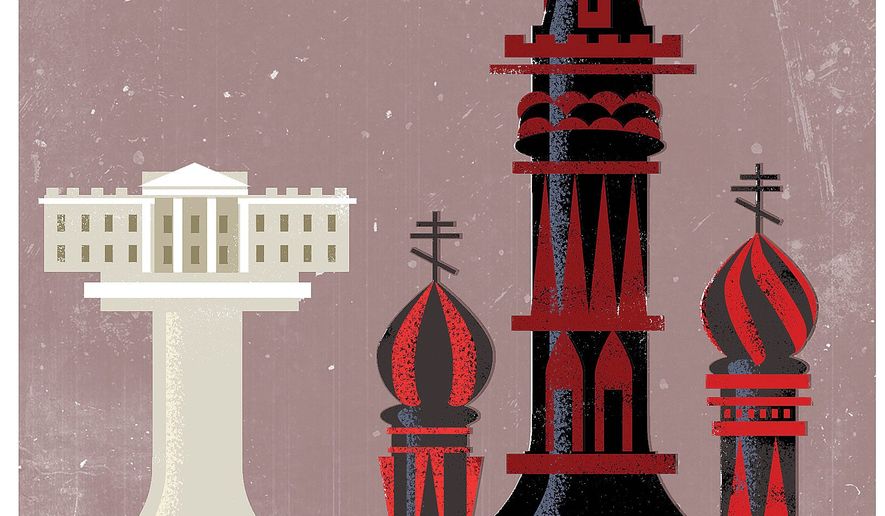OPINION:
As President Obama withdrew America’s influence and power from the world, the vacuum created was naturally filled quickly by our adversaries. China is moving aggressively to dominate the South China Sea without challenge. Iran’s power was enhanced enormously by Mr. Obama’s nuclear weapons agreement.
The greatest gains are being achieved by Russian President Putin. In the Crimean Peninsula and eastern Ukraine Russian power has become dominant. Those gains are expanding and becoming more entrenched each day in the Middle East.
Mr. Putin continued to assert Russian power, and to challenge President-elect Trump, quickly after the election. On Nov. 21, Russia announced that it was deploying Iskander-M nuclear capable missiles to Kaliningrad, a tiny Russian possession on Poland’s border. Those missiles were to be accompanied by S-400, a top-line Russian anti-aircraft and anti-missile system, making them proof against any attack except by stealthy weapons.
Mr. Putin continues to fill the vacuum left by Mr. Obama with elements of Russian military power. Nowhere is that — and the challenge to President Trump — more apparent than in Syria and Afghanistan.
Last March Mr. Putin announced the withdrawal of Russian forces from Syria. Unsurprisingly, he lied. Though a small part of Russian forces were withdrawn, more and different elements have been brought in. Russia has established permanent bases for its navy at Tartus and its air forces at Hmeimim. The Hmeimim air base (and probably the Tartus naval base as well) are being equipped with S-300 anti-aircraft and anti-missile systems, creating a Russian ability to control all Syrian airspace. If Mr. Trump decided to declare a “no-fly zone” in Syria, he’d have to use military force to deny Russian control of the airspace.
The Hmeinem base, according to February’s Air Force Magazine, is now officially Russia’s first permanent air base in the Middle East and the only one outside the former Soviet Union. That permanence is ensured by a treaty signed on Oct. 7 between Russia and Syria.
Russian naval forces based at Tartus can be expected to increase their operations in the eastern Mediterranean. Over time, Russia will increase the size and capability of the Tartus naval base to further their ability to operate in the Mediterranean.
Russia, and its partner Iran, now control the conduct of the Syrian war and will control its outcome. Russia’s presence in Syria, now made permanent, is a steppingstone toward further Russian influence and power in the Middle East. Another is Libya.
Russia’s inroads into Libya are best exemplified by its deepening ties to Gen. Khalifa Haftar, who reportedly controls the eastern half of the country and is an opponent of the U.S.-backed government. Russia showed its overt support for Gen. Haftar by inviting him aboard its aircraft carrier, Admiral Kuznetsov, in early January.
Mr. Putin is also attempting to build a bridge to the Taliban in Afghanistan. According to the Pakistani newspaper Dawn, the Russian ambassador to Pakistan revealed these contacts in March 2016, saying that they were intended to “promote reconciliation.”
The Soviets spent over a decade attempting to conquer Afghanistan, fighting the mujahedeen who became the Taliban. They tried and failed to set up a puppet government under Babrak Karmal. The Russians aren’t now attempting to promote reconciliation between the U.S.-backed Kabul regime and their old enemies. Instead, they are attempting to ally themselves with the Taliban in the hope that when U.S. forces withdraw, the Taliban will accept a Russian presence and military aid to help topple the Kabul government.
In another provocation, two Russian nuclear-capable bombers flew around Japan last Wednesday.
In 2005, Mr. Putin said that the fall of the Soviet Union was “the greatest geopolitical catastrophe” of the 20th century. He is attempting to bring post-Soviet Russia back to its power at home as well as abroad.
Two months before Mr. Trump was elected, the Russian government-connected newspaper Kommersant reported that Mr. Putin was ordering the concentration of the Russia’s domestic and foreign intelligence agencies into a new “Ministry of State Security” (the “MGB”) that would have the structure and power of a “KGB 2.0.”
The new “MGB” should be expected to be as aggressive and invasive as its predecessor. The KGB kept Russians living in fear and Western intelligence and counter-intelligence agencies worried and busy protecting their nations for decades.
Mr. Putin is following a very old Russian script. His opportunism will continue to take advantage of opportunities for intervention wherever America and its allies evidence weakness or inattention. Our intelligence community will be as busy as they were in the Cold War.
Mr. Trump hasn’t yet revealed what effect on our foreign policy his oft-spoken affinity for Mr. Putin will have. We shall hope that the trust he evidences in Mr. Putin will be tempered by his wariness of a bad deal. But Mr. Trump’s pragmatism, and his transactional view of events, may weigh against his businessman’s wariness.
The Soviet Union was, and Mr. Putin’s Russia is, expert at tempting the West into bad deals around the world. For dealing with the Soviets, Ronald Reagan prescribed the “trust but verify” policy. Mr. Trump would do well to add a corollary necessary to dealing with Mr. Putin: “trust has to be earned.”
Jed Babbin served as a deputy undersecretary of defense in the George H.W. Bush administration. He is a senior fellow of the London Center for Policy Research and the author of five books including “In the Words of Our Enemies.”




Please read our comment policy before commenting.